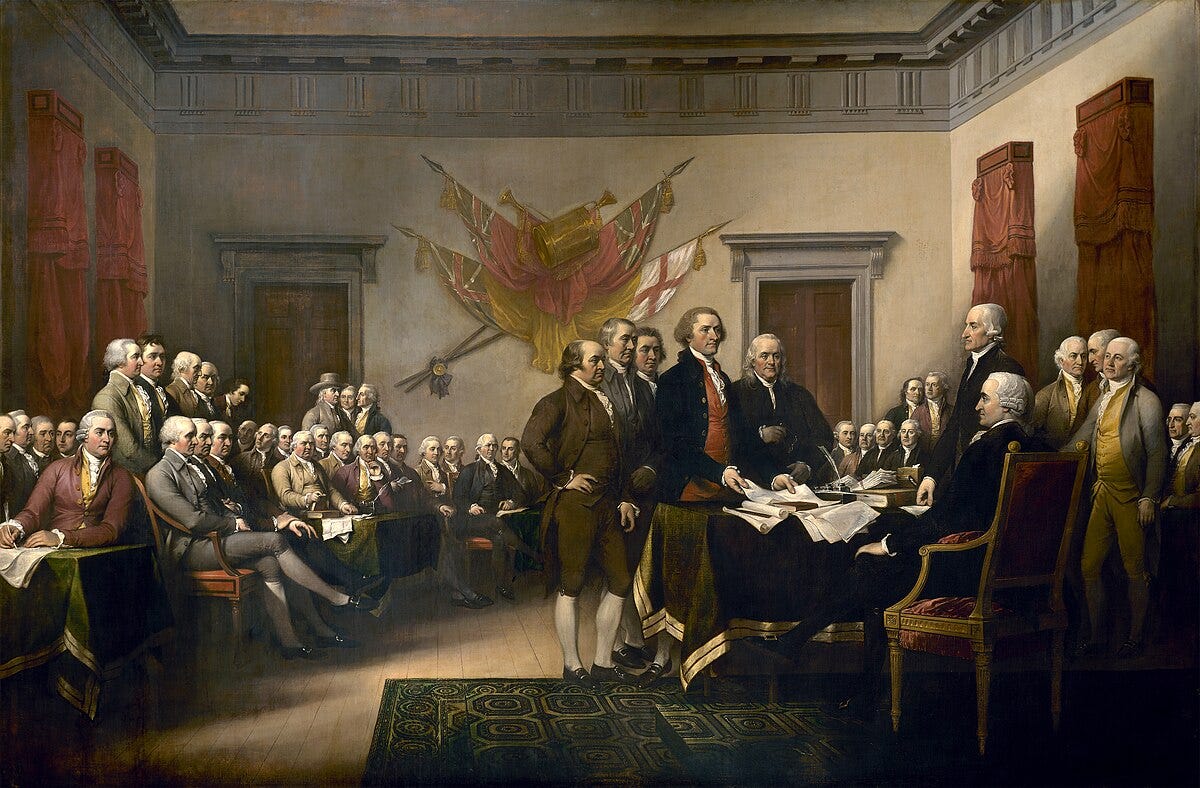America isn't for spectators
On achieving our country, elite moral decay and the Democrats' original sin
Thank you for being here. Before we proceed, I’m excited to share that Rob Henderson linked my essay on female social control. He has had a profound impact on my development, and I respect him even more because he sent something out that critiques himself. You all sharing my work has led to this strong signal that I’m doing something correctly. I sincerely appreciate you all. Secondly, I had a conversation last week with Baz, David Dennison, and Rohan Ghostwind, which you may enjoy.
i. Multiculturalism prevents a shared national identity
As I’ve evolved away from political tribalism, I’ve noticed the extent to which achieving a national moral identity has become impossible. I’ve been thinking about the nature of being American for some time, and my movement away from being ‘Indian’ has helped me uncover how American I am.
Being an American legally is distinct from spiritual identity; one can become an American citizen without forming any attachment to the nation-state of America as a moral agent in the world, and every nation exercises agency through its elite. Our elites, however, have steadily corrupted and abandoned their responsibilities. We can’t look outward to blame Trump on others; he is a reflection and result of our shared spiritual poverty.
Many nation-states born in the modern era had to self-define as coterminous with a religion, an ethnicity, a language, or a combination thereof. America is one of a handful that identified its moral agency without appealing to any of these; that is both its strength and greatest weakness. The idea of America depends on a shared sense of civic responsibility and belief in the democratic process to deliver results. Both the left and the right have abandoned this in favor of their own tribal notions of democracy.
We privilege every identity within America without grappling with what makes it distinctive. As a result, we don’t appreciate what we have, and being American is a source of endless shame. But how many of the people ashamed of their American-ness would enjoy living somewhere else? They’re always threatening to leave or fetishizing Canada & Europe without considering the tradeoffs required.
Everywhere you live that isn’t home requires you to adapt and adopt the host culture, or you can’t have a hope of establishing community; in America, however, you can keep yourself closed off within your ethnic bubble and still call yourself one. This is one strong reason why there’s less and less support for the social safety net: if people don’t feel tied to their fellow citizens through a shared moral identity, they won’t feel the generosity required to help those they don't know when they’re in need.1
I suspect this is one reason even Democrats’ core racially-defined constituencies are enraged about deregulated immigration, and by the notion of government benefits given to people who aren’t technically American. If being American gives you no privileges over outsiders, then faith in the nation’s ability to provide erodes.
In a series of lectures from the 90s, the philosopher Richard Rorty took on the cultural left that had eclipsed the reformist and class-focused left since the 60s. He observes the corrosive nature of multiculturalism2, which escaped the academy’s lab like a virus created from gain-of-function research.
Taking Rorty’s critique further, I argue that the elite has utterly abandoned a cohesive identity in favor of multiculturalism, which is no identity at all. It is the balkanization of the American spirit to the extent there was one during the post-WWII period.
Multiculturalism cannot serve as the basis for a shared moral identity. Achieving our country, therefore, is impossible without defining the American spirit beyond our ethnic identities and the flagellation of the left about endless national sins. As Rorty observes, the left views America through the lens of original sin, whereby committing certain acts is deemed incompatible with maintaining self-respect.3
The left, therefore, remains spectatorial rather than agentic in achieving our country.4 This reflects the modern malaise of letting things happen to you rather than being an agent in your outcomes; it is ontologically feminine in that it receives and doesn’t act. The left is thoroughly feminized without any structure, while the right is the masculine id untempered by its counterpart.
But being a moral agent is “to be unable to live with oneself after committing certain acts”. In this case, Rorty observes that we have three choices: to commit suicide, indulge in bottomless self-loathing, or develop the integrity never to commit such an act again.5 It is the act of self-making that defines an American. If I had been born in India, I wouldn’t have the freedom to create myself.
Rorty observes via John Dewey’s work that “self-loathing is a luxury which agents — either individuals or nations — cannot afford.’ Sin, Dewey argued, cannot be an explanation for tragedy.6
ii. Hating America and hoarding wealth
The modern left has dismissed America morally and treats it as a means to an end. This isn’t a political decision, but a move to preserve their class position. As Barbara Ehrenreich observed in Fear of Falling, the professional middle class woke up to the fact that they’re just one group of several interest groups.
This led to the ‘discovery’ of the working class and the poor through the media. But these classes were the ‘imaginative product of middle-class anxiety and prejudice.’7 Ehrenreich is a towering figure of the class-first left and founded the Democratic Socialists of America. She is forgotten, however, because she didn’t retreat into gender and race-based analysis and didn’t hew to the feminist party line. Her being a female critic of the professional class renders her almost invisible in the current leftist ‘discourse’.
It was implicitly understood that the working class was white and backward, rather than multiracial and at the forefront of the class struggle; militant labor activism was threatening to the PMC’s position. The working class in surveys was hostile to the professional middle class and less sympathetic to black activism; the latter position allowed the PMC to dismiss their concerns based on their racism.8 The working class, as discovered in the 60s, was white and male despite it being the most racially diverse, and became more female as women without degrees were compelled to enter the workforce, while middle-class women could still opt out.9
This stereotype about the working class persists among the professional class. Blacks and Latinos are always defined in terms of race, despite most being working class; this allows the modern professional left to dismiss a focus on class as inherently racist. We saw Bernie Sanders being rejected as a closet racist for focusing on the material over the symbolic. Because older black people preferred the Democratic establishment, its candidates took on a moral authority that coerced your vote instead of earning it. That is emotional blackmail.
Taking Ehrenreich’s critique further, the material grievances of the working class had to be rationalized away as being born of racism instead of the chasm between professional-class workers and manual laborers. This is the legacy shaping the professional-class left today.
The self-interested left necessarily turned away from class struggle; why would anyone threaten their material position? But they couched it in moral posturing, so it’s impervious to critique. Rorty observed that the cultural left retreated to critiquing mindsets rather than the economic arrangements that benefit them at the expense of the working class.
Rorty correctly notes that the left refuses to hold two thoughts in their heads: that racism is real, but its remedy is class-based politics of material outcomes that lift all boats, not endlessly shitting on America for its sins and creating a race-based moral hierarchy.10
The right understandably wants to break things because the left seeks to follow processes without considering the quality of the results. I cheered on some of the wrecking. But in practice, neither of these approaches has ever built anything of value. Creating a cohesive society requires people to believe that the process is fair and that there is elite accountability for outcomes.
Elites have utterly abandoned their duty to the people, and that’s contributed to Trump’s rise. He’s the result of decades spent ignoring material facts on the ground and the unwillingness of the professional class to give up the opportunity they’ve hoarded.
iii. Democrats’ original sin: the racial hierarchy of morality and Kamala Harris
Democrats’ racial conception of morality is their original sin.
Rorty and others have pointed out over the decades that the notion of sin drives the cultural left’s priorities. Everywhere I look, social relations have become about signaling moral purity and confessing sins, and many of the white elite, especially women, are now consumed by guilt for merely existing. Guilt, however, is a selfish emotion, and they languish in self-pity while bringing society down with them, foisting corrosive empathy onto everyone else. I can no longer be around this kind of leftist without feeling deep discomfort.
The below section is the kind of writing I will be paywalling in the future. Please consider upgrading to get more such incendiary but honest analysis.
But, I also can’t lead them away from this self-loathing by simply telling them it’s ok. Until the white elite stops flagellating and feeling guilty, they’re equally unworthy of power as the right-populists. No one acting from a place of self-loathing deserves the responsibility of leadership, full stop. This self-loathing justifies hoarding material wealth and opportunities while absolving oneself of the consequences for everyone below them.
I read Original Sin because I wanted to understand the extent of corruption within the Biden administration. I found that the Bidens were as corrupt as the Trumps, although they hid their naked self-interest in the guise of tragedy and morality. Not only was Biden cognitively declining and delusional about his prospects, but the operatives around him had no reason to turn off the money spigot for themselves by being honest. The administration’s bureaucrats took advantage of Biden’s state to push their agendas without checks, while Jill and Hunter Biden wanted to cling to power at all costs.
Biden refused to step down in no small part because he correctly estimated that Harris couldn’t have beaten Trump, but his original sin wasn’t even refusing to step down. It was picking Harris in the first place because of her identities. It was widely reported at the time that he committed to choosing a black woman, thereby casting doubt implicitly on the merits of whoever he chose. Let’s remind ourselves of the reality of her position at the time:
She had dropped out of the primary before Iowa and thereby didn’t prove that her party even wanted her through a democratic process.
She had been a senator for less than one term without passing any primary legislation and had built her profile on her identity, vibes, and grilling Brett Kavanaugh.
Before the Senate, she had only been the attorney general, a bureaucratic and non-political position, in California, an effectively one-party state.
Sex is a weapon and a tool that only women use to get resources. Using it for material advancement in the modern age is cheating and the antithesis of what feminism claims to be. Whether she was dating Willie Brown at the time of her ascent, therefore, doesn’t matter. She tainted any merit she had with sex.
There were more qualified women with executive experience whom Biden might have chosen. Still, the Democratic establishment has oriented itself around the original sin of creating a moral hierarchy by race and gender. Their measure of merit was identity symbolism. They wanted to keep Harris as a canvas on which anything could be projected, with her identity as the legitimizing force.
But because they picked arguably the least qualified black woman, they couldn’t run her and hope to win. But they also couldn’t cast her aside because she was black, so they painted themselves into a corner and lost because of race. And because the Democrats love thought-terminating cliches, it was easy to blame her subsequent loss on racism and sexism.
Some gems from the book:
Many on the Biden team felt that Harris didn’t put in the work and was also just not a very nice person. Several quietly expressed buyer’s remorse: They should have picked Whitmer.11
Vice President Harris would have to be the nominee, not least because the most loyal Democratic voters were African Americans, particularly African American women.12
A Black congresswoman argued before the entire caucus. If he gets out, this is going to fall on the shoulders of a Black woman. And Kamala Harris is going to lose, and everyone’s going to blame Black people.13
There was a real sense from Black members that a Harris candidacy—and a devastating loss that many seemed to anticipate as a foregone conclusion—would be horrible for people of color. And yet that argument often came with the caveat that the party could not pick any replacement nominee other than Harris.14
Finally, when people appealed to Clyburn to help push Biden out:
“If Joe Biden were to get out of the race and Democrats were to then bypass Kamala Harris, what would be the impact on Black turnout? Y’all think you can come up with a polling question to get me that answer?”15
The Congressional Black Caucus didn’t understand their voting bloc because they’re removed from the working-class blacks they claim to represent.
If we harken back to the 2016 and 2020 primaries, a primary argument in favor of Hillary and Biden was that black voters preferred them, as though no other voting bloc mattered. It was utterly unrecognized that Latinos are a larger portion of the population than blacks, and Asian-Americans are also a growing bloc. Both groups are claimed as Democrats’ core constituencies.
They claim to be a big tent, but still have a racial hierarchy of political legitimacy. The opinions and political preferences of black people aren’t inherently more accurate, pragmatic, or moral than those of any other group. They are an interest group like any other. But, progressive logic has made blacks beyond reproach, and older black voters were treated like the final word on what the party would do and, implicitly, the nation’s priorities. That is one primary reason they lost: they listened to a specific slice of the black population, women, and they ended up leaving black men behind as a result. But saying this carries the risk of being accused of racism, so people don’t say it.
The original sin of the Democrats has been the creation of a moral hierarchy among the races, wherein they use each group for their cynical ends.
America can’t be fully achieved without setting aside purity tests on social positions, which applies to both the left and the right. The left, however, has a far more corrosive problem because its brand is now anti-merit. It won’t be easy to rebrand, and it may be damaged beyond repair. Once you demonize masculinity, reason, and merit, what do you have other than vibes? I don’t want elites in charge who rule based on vibes and enforce moral hierarchies of race and gender. I also don’t see the right as a home for someone like me. So I continue, like many of you, seeing the decay and trying to live differently. I’m relieved to have been born here and claim my identity as an American. There’s no self-determination without competition, and competition can’t be founded on anything other than merit.
Putnam, R.D. (2007), E Pluribus Unum: Diversity and Community in the Twenty-first Century. The 2006 Johan Skytte Prize Lecture. Scandinavian Political Studies, 30: 137-174. https://doi.org/10.1111/j.1467-9477.2007.00176.x
Richard Rorty, Achieving Our Country, Harvard University Press, 1998; 22
Ibid., 32.
Ibid., 36.
Ibid.
Ibid., 33.
Barbara Ehrenreich, Fear of Falling, 114.
Ibid., 121.
Ibid., 125.
Rorty, 79. Rorty didn’t say the line about shitting on America; that was me taking it further.
Jake Tapper and Alex Thompson, Original Sin, 70.
Ibid., 225.
Ibid., 244.
Ibid.
Ibid., 263








Some people think that the left is using multiculturalism in a malicious/subversive way. I see it differently: multiculturalism is a natural worldview for people insulated by wealth and privilege who’ve been taught to value superficial diversity and are unaware of the downsides of other cultures (because they haven’t experienced them). It’s easy to believe that everyone just wants status and money and will be outwardly nice when everyone in one’s milieu only wants status and money and is outwardly nice.
“The left… remains spectatorial rather than agentic in achieving our country.”
Bingo. People have gotten so used to virtue signaling and displaying opinions and relying on massive bureaucracies and programs to meet their needs that they’ve forgotten that were supposed to BUILD changes in the world-with our selves and families and communities. So many on the left see ‘politics’ as a matter of posting and liking and voting. They’ve forgotten the fact that America allows you to actually intervene in society in real and active ways. This seems insufficient to many because it doesn’t involve compulsion: volunteering and building and organizing doesn’t allow you to control the speech or behavior of others, or take their money. But that’s why it’s such a beautiful option!
https://jmpolemic.substack.com/p/surveying-the-anti-patriotic-party
This is one of your best articles yet, Anu. And you just convinced me I need to read Original Sin. I thought it was just about Biden's decline & the coverup but apparently it's about a lot more including the family's corruption. Adding this to my Christmas wish list!